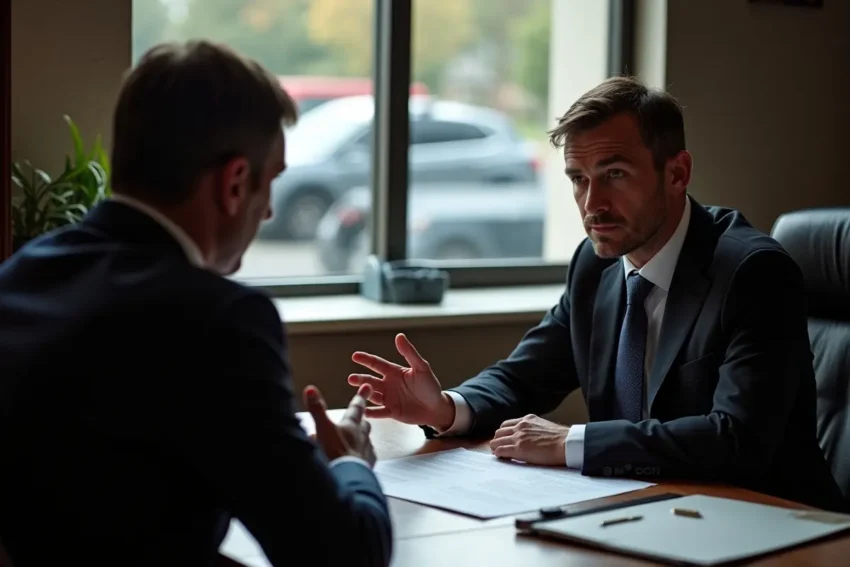When Police Want to Interview You: Why Legal Advice Matters Before You Say Anything

The instinct to explain everything to police feels natural. Innocent people think that cooperating fully and answering every question demonstrates they have nothing to hide. This logic makes sense on the surface, but police interviews don’t work the way most people imagine.
What seems like helpful cooperation can create legal problems that wouldn’t exist if someone had spoken with a solicitor first, even when that person is completely innocent of any wrongdoing.
Contents
How Police Interviews Actually Work
Police interviews aren’t casual conversations. They’re formal evidence-gathering procedures where everything said gets recorded and can be used in court. Officers conducting interviews are trained professionals who know exactly what they’re doing. They understand legal requirements, know how to phrase questions, and recognize when answers might be useful for building a case. The person being interviewed typically has none of this training or understanding.
The power imbalance in interview rooms is significant. Police hold information about why someone is being questioned, what evidence exists, and what they’re investigating. The person being interviewed knows only what they’ve been told, which is often minimal. This information gap makes it nearly impossible to judge which questions are routine and which are legally significant.
Officers might seem friendly and reassuring, presenting the interview as a simple matter of clearing things up. This isn’t deception exactly, it’s just professional technique. Building rapport makes people more comfortable and more likely to talk freely. But comfortable conversations in police interview rooms aren’t the same as chats with friends. Every word matters legally, whether it feels significant in the moment or not.
Why Innocent People Need Solicitors Too
The assumption that only guilty people need legal representation is dangerously wrong. Innocent people can say things that sound suspicious when taken out of context, misremember details under pressure, or inadvertently provide information that seems to contradict other evidence. These problems happen regularly to people who’ve done nothing wrong but didn’t realize how their words would be interpreted.
Memory works imperfectly under stress. Police interviews create pressure even for people who aren’t guilty of anything. That pressure affects recall of details, timing, and sequences of events. Someone might genuinely believe they were somewhere at a certain time, state that confidently in an interview, then discover later that their memory was slightly off. That incorrect statement now exists as recorded testimony that can be used to suggest dishonesty, even though it was an honest mistake.
Professional criminal solicitors understand how interviews can go wrong and know which details matter legally versus which are irrelevant. Having that expertise present means someone can advise whether a question should be answered, whether an answer needs clarification, or whether it’s better to say nothing. This protection applies equally to innocent and guilty people because the legal risks of unadvised interviews affect everyone.
What Legal Representation Actually Provides
A solicitor present during a police interview serves multiple functions. They ensure police follow proper procedures and don’t use inappropriate questioning techniques. They can request breaks when clients are tired, confused, or overwhelmed. They advise on which questions to answer and can suggest how to phrase responses to avoid creating unintended implications.
The right to have a solicitor present is free in police interviews. Duty solicitors are available 24 hours a day at police stations, and they cost nothing to the person being interviewed. This isn’t about affording legal help, it’s about using a right that exists specifically to protect people during police questioning. Choosing not to use it doesn’t demonstrate innocence or cooperation, it just means giving up protection that’s freely available.
Solicitors can’t tell police what to ask or stop an interview from happening. They can’t prevent arrest if grounds exist or make evidence disappear. What they can do is ensure the interview process is fair, that rights are respected, and that responses don’t create unnecessary legal problems. This matters regardless of guilt or innocence.
Common Ways Interviews Go Wrong
People often think they can talk their way out of police suspicion by explaining everything thoroughly. This rarely works as intended. The more someone talks without legal advice, the more material exists that can be analyzed, questioned, or potentially contradicted. Police aren’t looking for explanations that clear someone, they’re gathering evidence about what happened.
Questions that seem simple often aren’t. “Where were you on Tuesday evening?” sounds straightforward, but the answer might place someone near a crime scene or contradict what witnesses said or reveal information police didn’t previously have. Without knowing why the question matters, it’s impossible to judge whether answering helps or hurts.
Some people try to be helpful by speculating about what might have happened or suggesting explanations for evidence. This speculation can be treated as statements of fact in court, even when clearly presented as guesses during the interview. Once something is said in a recorded interview, explaining later that it was just a theory doesn’t erase the statement.
Admitting to minor wrongdoing while denying major accusations is another common mistake. Someone might acknowledge they were somewhere they shouldn’t have been or did something relatively minor, thinking this honesty will be believed when they deny more serious allegations. Instead, the admission provides evidence of opportunity, presence, or behavior that supports the prosecution case.
The “Nothing to Hide” Fallacy
The idea that requesting a solicitor makes someone look guilty is a myth that police are happy to let people believe. In reality, exercising legal rights is normal and expected. Judges, magistrates, and juries understand that having legal representation during police interviews is standard practice. It doesn’t suggest guilt any more than locking your front door suggests you’re hiding criminal activity inside your house.
Police may express disappointment or frustration when someone requests a solicitor. They might suggest that calling a solicitor will delay things unnecessarily or that simple questions don’t require legal advice. These responses are understandable from a police perspective, they’re trying to do their job efficiently. But they’re not serving the interests of the person being interviewed. What’s efficient for police isn’t necessarily what’s best for someone’s legal position.
Waiting for a solicitor does cause delays. It might mean spending extra hours in custody while the solicitor travels to the police station. This delay feels frustrating and makes people want to get the interview over with quickly. But those hours of waiting are insignificant compared to the potential consequences of an interview that goes badly because no legal advice was available.
What Happens After Refusing to Answer
Exercising the right to silence or declining to answer questions without legal advice isn’t obstruction. It’s using legal protections that exist specifically for this situation. Courts can draw inferences from silence in certain circumstances, but solicitors understand when those circumstances apply and can advise accordingly. Blanket refusal to answer any questions isn’t always the right approach, but neither is answering everything without guidance.
The interview will happen eventually, either after a solicitor arrives or after someone decides to proceed without one. The question is whether it happens with appropriate legal protection or without it. People who initially spoke without a solicitor often wish later that they’d waited, regardless of whether they were guilty. The reverse rarely happens. People who waited for legal advice rarely regret having that protection in place.
Making the Decision
When police want to conduct an interview, whether at a station or elsewhere, the decision about legal representation needs to be made quickly. The natural impulse is to explain, cooperate, and get the whole thing over with. That impulse should be resisted until speaking with a solicitor, even if that means delays and discomfort in the short term.
Legal proceedings don’t care about good intentions or honest mistakes. What matters is what gets said in recorded interviews and how those statements can be used in court. Having professional legal advice during interviews ensures that the process is fair, that rights are protected, and that innocent explanations don’t accidentally become evidence of guilt. This protection matters equally for those who are guilty, innocent, or somewhere in between, because everyone deserves fair treatment under law.



